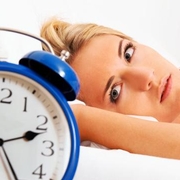Information you need to live a happy, worry-free retirement!
- Home
- » Resources
- » Blog
- » Wellness
- » Putting Insomnia to Bed
Putting Insomnia to Bed

Insomnia — difficulty in initiating or maintaining sleep — is a problem for millions of Americans. Not a disorder, insomnia is actually a symptom that can be caused by a variety of factors. Thankfully, there are proactive steps you can take to put your insomnia, and yourself, to bed.
What makes insomnia so debilitating is that it undermines the very purpose of sleep — to allow your body to repair and rejuvenate. Good sleep also reduces stress and feelings of fatigue, and the process of dreaming even helps reboot your nervous system. That’s why when you don’t get sufficient sleep you feel all out of whack. It’s far more than just, “I’m tired.”
Knowing more about sleep helps you better understand insomnia. There are five distinct stages of sleep, said Seema Agarwal, a sleep expert and licensed acupuncturist:
• Stages 1 and 2 are light sleeping, which is what occurs the majority of the night.
• Stages 3 and 4 are deep sleeping, or “delta sleep,” and rest and restoration.
• Stage 5 is the dream state which includes rapid eye movement (REM).
Agarwal says patterns of sleep generally follow the progression of light sleep / deep sleep / REM / light sleep / deep sleep / rest and restoration. With insomnia, you either struggle getting to sleep to begin with, or wake up in the middle of the night and can’t get back to sleep, or wake up early and can’t return to sleep. Sleep is triggered in the body chemically, she says, when the pineal gland produces melatonin. Bright light or sunshine serves to stop melatonin production.
“Chronic insomnia associated with psychological problems can be deeply rooted in stress, anxiety or depression,” Agarwal wrote for Women Alive. “Insomnia associated with medical problems can be caused by … iron deficiency anemia, breathing disorders, kidney dysfunction, diabetes, and in the case of HIV a variety of medication side effects. Insomnia can also be due to poor eating habits, caffeine and lack of exercise.”
So how can you combat your sleeplessness? Here are six tips:
Sleep when sleepy. It sounds basic, but it’s easy to disregard the body’s readiness for sleep. Sleep medicine pioneer Dr. William C. Dement says you need to work with your biological clock, not against it. “The biological clock is responsive to light at certain times,” he told CNN. “Bright light in the morning will tend to advance the clock. Alertness will occur earlier and sleep will occur earlier.” You can also cut down your sleep to increase your sleepiness. If you only need seven hours but are sleeping for nine, Agarwal speculates, the seven-hour sleep spreads over the nine hours and becomes less effective.
Try a hot bath. Patricia Murphy and Scott Campbell reported in the journal Sleep that a nighttime drop of body temperature can be a physiological trigger for sleep. They suggest a hot bath about 90 minutes before bedtime. When you get out of the tub, your body temperature will drop rapidly, which could help you fall asleep faster.
Limit intake of alcohol. Alcohol can cause fractured sleep, reducing the total amount and quality of your sleep experience. “It’ll help you get to sleep quicker,” sleep specialist Dr. Dale Edgar told CNN, “but when the alcohol wears off in just a couple of hours, you’ll have this rebound wakefulness right after the effect.”
Reduce caffeine. Agarwal says about three cups of coffee per day can lead to addiction, and caffeine is also in sodas, chocolates and some medications. “It can take a long time to clear caffeine from the body,” she says, “and side effects of headaches in the morning and urinating at night are common.”
Eat sleep-aiding foods. There are foods that increase your production of melatonin. These include soy nuts, pumpkin seeds and dried watermelon seeds, chicken and turkey, and cottage cheese, as well as oats and barley, sweet corn, tomatoes and bananas.
Have a “sleep chamber.” Make your bedroom a tranquil place of rest. Dr. James Wellman, medical director of the Sleep Disorders Center in Georgia, suggests getting just the right mattress for you to maximize comfort is essential, and also says the bedroom should be cool, anywhere from 60-65 degrees. And it shouldn’t double as your office or a place to work. Don’t take your laptop to bed.
For more information, visit sleepsciences.com and consult with your physician.



